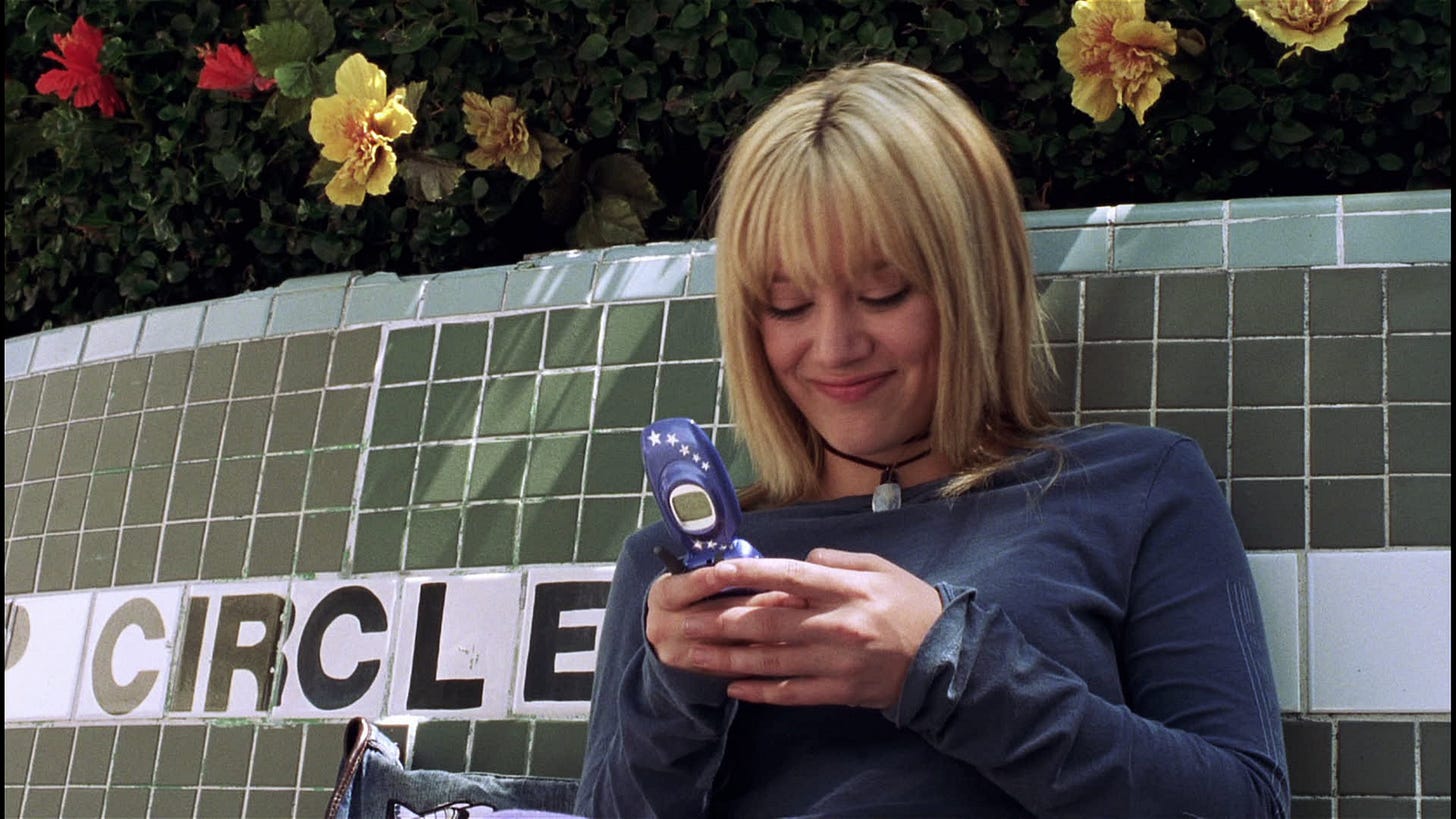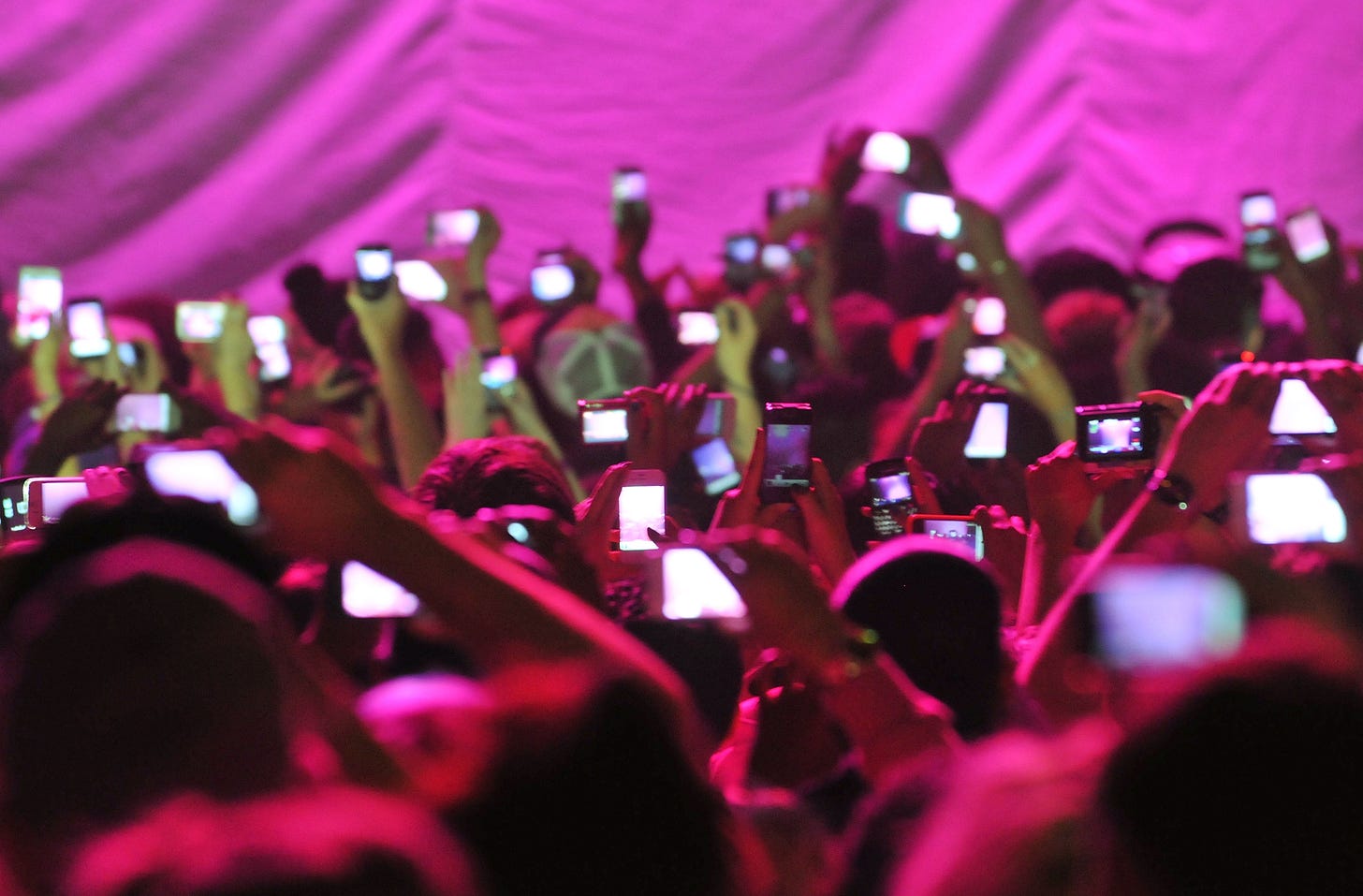
When thinking about how commonplace digital screens are in modern society, it’s hard to believe that they’ve been around for such a small amount of time. If the length of human civilization were a body, the period in which people have screens in their personal dwellings wouldn’t even be a toenail clipping. And yet, we’ve grown so fond of our smart devices and their life-changing applications that they are a personal extension of us. They are the closest thing human beings have to a direct portal to another universe. Even in their physical design - their flat nature, with dancing colors and shapes - they emulate something out of a mid-century sci-fi or fantasy story. A magic mirror that grants your wishes. A doorway to another dimension. A conduit for transformation.
It makes sense why something so non-human would have such addictive qualities. Most other items people get addicted to are of the man-made variety - hard drugs, mega-processed sugar, gambling, etc. Our lizard brains - the parts that are the most basic, such as the amygdala with its concern for fear and reward - are not equipped for having so much at their fingertips. We can “see” and “experience” anything we want at a moment’s notice.
I deleted Tik Tok from my phone about five months ago. I wrote about the reasoning leading up to this decision at length here, but it mainly had to do with quick hits of dopamine spiraling into an uncontrollable addiction. Time in my daily life that could have been better spent engaging in enriching activities was sucked into the Tik Tok vortex, with its endless scroll bringing the promise of increasingly entertaining content.
I was recently listening to Julia Hava and Eliza McLamb’s podcast, Binchtopia (one of my newfound favorites) and the episode revolved around how damaging smart phones are for human health. Largely citing evidence from this New York Times article by Catherine Price, Hava and McLamb explained that smartphones interfere with our sleep, memory, relationships, self-esteem, and decision-making skills, things that are all well-documented. It’s also well-known that phones have an addictive quality because of their manipulation of our dopamine systems. However, it was most shocking for me to learn about its effect on our cortisol levels.
According to David Greenfield, professor of clinical psychiatry at the University of Connecticut School of Medicine and founder of the Center for Internet and Technology Addiction, our cortisol levels spike when our phone is nearby, in sight, or even when we’re just thinking about it. Cortisol is our body’s main stress hormone, and while it’s an important hormone to possess due to its ability to get us to accomplish things, elevated levels of it can lead to type 2 diabetes, fertility issues, heart attacks, stroke, and other adverse health outcomes.
What’s even more jarring to me is that elevated cortisol levels can also impair the pre-frontal cortex, the part of our brain in charge of rational thought and decision-making. This is also the part of the brain that is most impacted when we’re drunk. Thus, being on our phones for many hours of the day is akin to being in a state of drunkenness, with our ability to make rational decisions tarnished.

This information alone, on paper, should be enough to encourage us to get off our phones more. Delete the apps with endless feeds, lock our devices in a safe, and throw away the key. I for one have no desire to put my mind and body through such maltreatment. But, of course, kicking addiction is not that simple. The facts are rarely enough when your mind and body are this reliant on something.
Apart from the actual physical mechanics of addiction, I also think there’s something to be said about how embedded the internet and social media are in our modern world. Today, it feels as though one cannot have a physical presence without also having a metaphysical one online. When meeting new young people today, it’s often more routine to ask them for their Instagram handle (or their Snapchat, God forbid) instead of their number, as exchanging digits can feel too formal. And when someone claims they don’t have an Instagram, we (either implicitly or explicitly) deem them peculiar. Out of touch. Suspect. Disconnected. Someone without social media is someone without a finger on the pulse of culture.
In addition, having a personal brand is what allows people to be upwardly mobile in society. Institutions of higher learning make the practice of designing a Linked-In page a workshop, as they would any other school subject. Students learn how to select the right photos and discuss their work experiences using the right words, so they can win over the attention of a recruiter and start safeguarding their own financial and cultural capital.
And what I find the most challenging is the fact that to be a self-starter - initiate your own personal project or business - social media almost always has to play a role. This is the case whether you’re selling homemade crocheted goods out of your college apartment for extra cash or trying to share your ideas with the world via an online newsletter. Marketing is all about harnessing peoples’ attention and at the current moment, the majority of people’s attention is directed toward social media outlets.
I often find myself going back and forth on the prospect of deleting all social media off my phone. I want to make a plan to put more boundaries in place, as I can feel my brain turning into soup every time I spend excessive idle seconds of my day on Twitter. Nonetheless, I think what’s holding me back is the idea that I will somehow not be a part of the world if I’m not on social media.

I’ve been an active user of the internet since before I entered middle school. I was a part of fan communities, followed influencers, and shared details about my own life during some of my most formative years. I know this experience isn’t unique to me. Millions of Gen Zers like me were active on the internet during their most impressionable years. As other forces like family, friends, and school do, social media played a role in shaping our personalities. Influenced the way we want to present ourselves to the world, the career path we want to follow, the place we want to live - the person we want to be.
In this way, I think many of us have developed a co-dependent relationship with social media and the internet. It’s a security blanket. A world that we help create as much as it helps create us. Without it, what kind of people would we be? What kind of interests might we have? What would there be to talk about?
Especially when it comes to writing a blog that largely centers on internet trends and discourse, what would someone like me write about without being on social media? I often worry that my already dwindling presence on apps like Twitter is what’s impairing my ability to reach more people with my newsletter. And yet, spending too much time on social media makes me feel detached from the real world and the people I love in it.
The thought of detaching ourselves from the internet is like detaching a limb from our bodies. Or taking a chunk out of our brains. It’s a part of who we are.
So, who are we without the internet?
When learning how to ride a bicycle, it’s common for a parent to hold the bike steady as you pedal. After a few dozen trial rounds, before you know it, they’ve let go of the bicycle and you’re riding along, holding it steady all on your own. Regardless of how fearful you were when you first sat on the seat and pushed your foot on the pedal, you’ve learned that you’re capable of doing it. Once you learn how to do it, it’s hard to forget it.
I think learning to live more offline is quite similar. Through years and years of using the internet as our main source of conversation and entertainment, we’ve learned to think that it’s a fundamental part of our lives. In reality, our brains were never designed with social media in mind. Every one of us, at least as a small child, has experienced a time without social media sucking up huge portions of our days - getting back to that isn’t as scary as we think, especially since it’s what our brain wants.
I found that learning to live without Tik Tok was much like riding a bike - familiar and hard to forget. Withdrawals can occur at first. For me, they were mainly in the form of boredom and feeling the slowness of my day - both of which aren’t inherently bad and even turned out to be good for me. I’ve started reading, writing, and reaching out to friends more because my brain wasn’t crashing with exhaustion from an overload of information. Getting off Tik Tok was quickly like food for my brain, allowing me space and time in a way I hadn’t experienced in a while.
In addition, it’s surprisingly still quite easy to get a pulse on what’s happening on the internet while being more offline. On social media, there is such an urgency to know every little detail about what’s going on in the lives of people and public figures and analyze it with fervor. Rather than feeling the need to know every trivial detail, being more offline grants us the powerful ability to seek information through ways that aren’t a mindless, indefinite force-feeding of information. Ways that allow for more meaningful and mindful connection to our physicality and to our neighbors. Reading a newspaper. Talking to a friend rather than making presumptions about their life via an online profile. Or simply basking in the pleasure of not needing to know everything and offering mental space to engage with things that are happening in your real life, community, and world.
This isn’t to say that the internet and social media are entirely bad conceptions because that’s not the case. The internet and smart devices in particular have facilitated meaningful connections that would have otherwise never been able to happen. They can be used for good. Unfortunately, so much of this connection and attention we’re giving the internet is being exploited for profit by big corporations. Companies that want social media to become increasingly intoxicating so that our eyeballs never leave our screens. Intervention isn’t just a good idea - it’s a necessity.
So, who are we without the internet? Learning to live more offline doesn’t immediately erase our life’s problems, but neither does spending the majority of our time online. What the offline world offers us, is a world in which we can have a bit more control. More control over the ways we choose to spend our time and access our information. More control over the speed at which our lives can move. Who we are without the internet is, surprisingly, ourselves. Maybe even more of ourselves than we allow when scrolling. Maybe even with the saturation turned up a bit.
If you enjoyed this post about internet addiction, I suggest checking out an older post of mine from September on Tik Tok, as it contains similar themes. Click here to read!





Thank you for writing this article , make me think about the nights I cannot sleep associated with excessive use of internet .
i really like your metaphor of riding a bike. i deleted tiktok quite a few months ago now (can’t remember exactly how long ago lol) and currently dont have any social media apps on my phone. at first it was stressful, but youre so right, it does get easy and familiar after a while. i dont even think about checking my phone when im waiting in lines or standing in elevators anymore. life feels easier and i feel more aware. i’m happy to see other people experiencing the same things